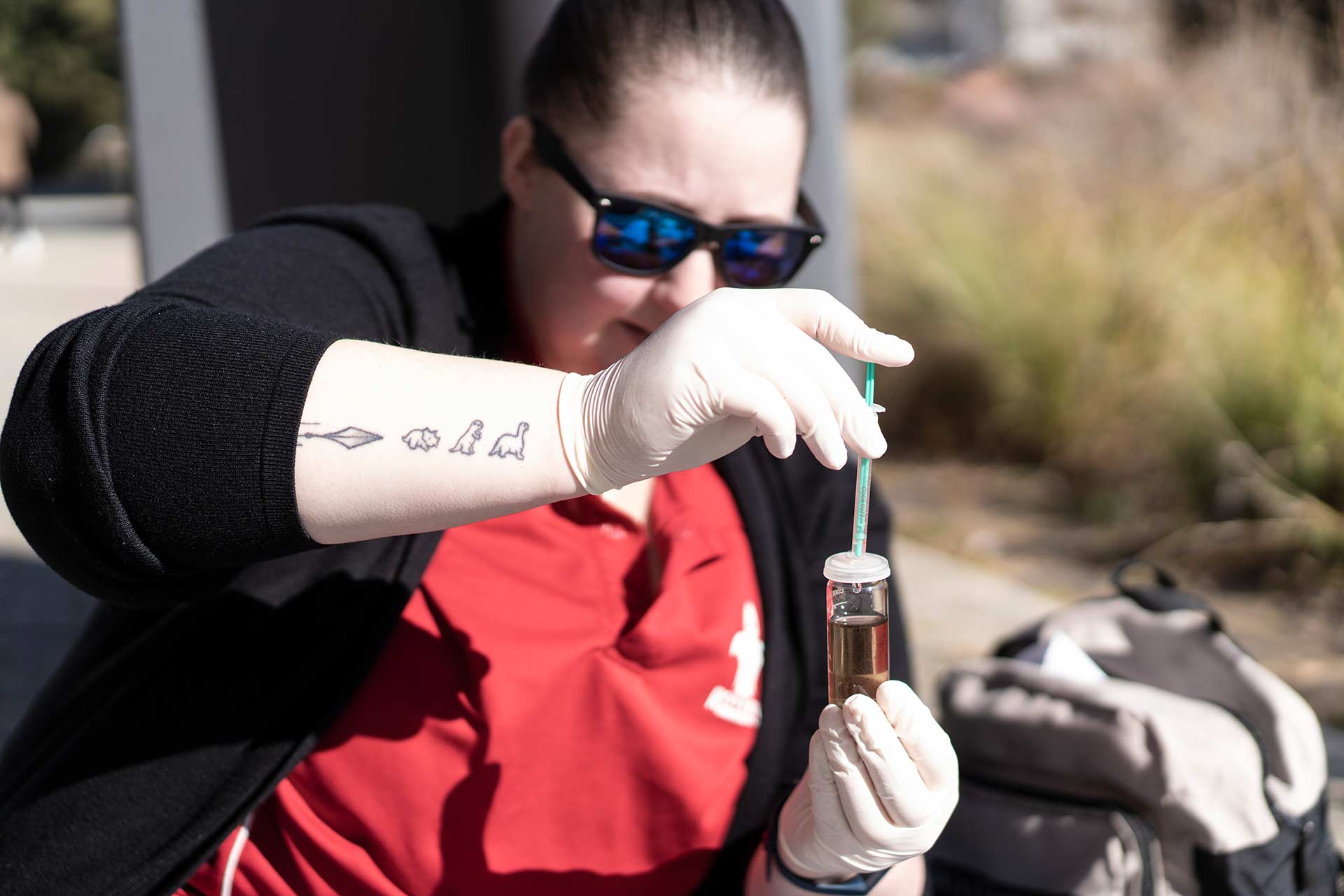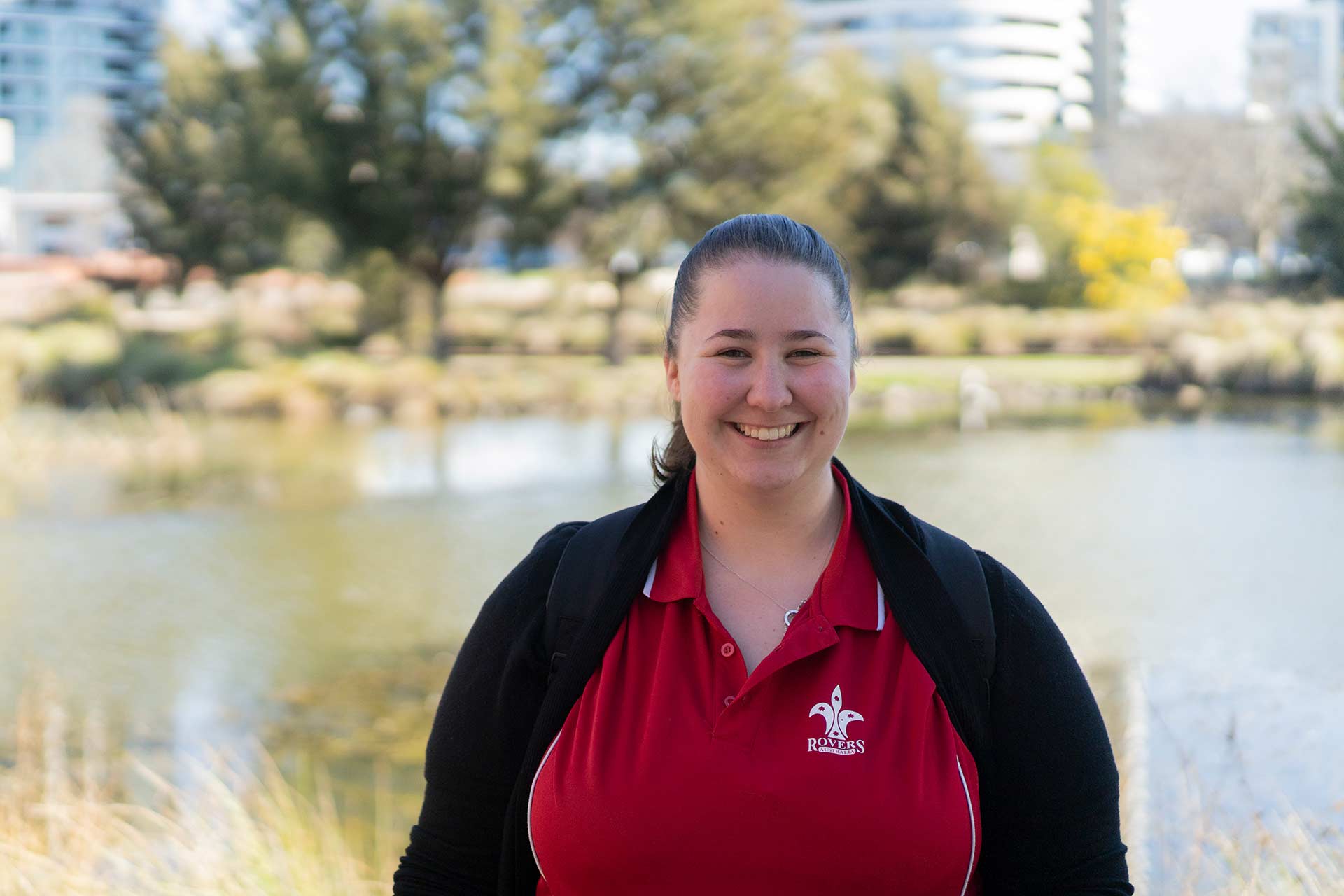Being busy is no barrier to volunteering
Liz White loves the opportunities her monthly Waterwatch testing gives her to connect with her local community, play at being a scientist, and inspire young people.
Volunteer with: Waterwatch
When you think of ‘environmental volunteering’ you probably don’t think that it will occur in an area surrounded by a skate park, a college, and a high-rise development, but that’s where Liz conducts her monthly Waterwatch testing.
Liz has been testing the water at a pond connected to Lake Ginninderra in Belconnen for about a year. Each month, she tests the nitrates, dissolved oxygen, turbidity, phosphates, and temperature of a small sample of water from the pond. This process takes about an hour, and Liz can do most of it at home or at the site.
Liz demonstrates the testing procedure with a long metal claw that holds the water bottle to make it easier to collect the water. ‘We start with a simple water bottle and test once a month to see what changes over time’.

In addition to the water quality testing, Liz also looks out for the wildlife and any debris and rubbish. And she’s seen some strange things, ‘Being in an urban area means you find things like scooters, trolleys, once we had a pram’. There’s also a surprising amount of wildlife, Liz has seen frogs, snakes, waterbirds, and even some Rakali (native water rats) while canoeing on the adjoining lake.
Despite the rubbish and fishing out the occasional odd item, Liz really enjoys doing her testing in an urban area because it allows her to connect with the community.
‘I’m lucky here that I’m in a central location, so I often get people stopping me and asking questions. I like that because you’re bringing the project to the wider community and they start taking notice.’
Liz is also a Rover Scout with Ginninderra Sea Scouts. She got involved with Waterwatch as part of a community development project for scouts.
Nowadays, she takes young scouts and girl guides out with her to teach them about Waterwatch and caring for the lake. ‘I’ve had about 80-90 kids come out and do the testing with me. It’s great because they’re the ones who are going to be looking after the lake in the future. It’s so much fun, they love playing mad scientist. They get really involved and really enjoy it. I’ve had five-year-old following these instructions and they’ve been able to follow them really easily.’
‘I think volunteering empowers the community, and it’s nice to be outside.’
‘If they’re interested when they’re kids, I think it fosters that interest in science throughout their life’
Liz likes that the data she collects contributes to ACT’s water quality data, ‘It’s kinda cool to think that my site is part of a number of different sites, all that data builds up and allows people to build cases. It’s kinda cool to think that the hour I spent out there this month has contributed to someone’s research project’.
She also appreciates that her Waterwatch volunteering allows her to play around with science ‘If you don’t work in a science-based career you don’t really get to do a lot of it as an adult, so Waterwatch allows me to get back to my science roots.’

Overall, Liz thinks that her role ‘is just a good thing. It doesn’t take a lot of time. It’s getting the entire community involved which I think creates a better sense of belonging and gets people to care about the environment more.’
Liz’s favourite thing about volunteering is ‘the people you meet. When you’re volunteering everyone wants to be there and everyone has the same mindset about things. It’s not like work where people don’t want to be there that day.’
Liz has a busy schedule, but says ‘I’m a rover scout, a girl guide leader and a nurse, and I do this. There are so many opportunities out there in Canberra for people who are time poor.’
Her advice is to ‘just reach out to people. A lot of groups are active on social media which makes it easy to discover what’s out there. You just need the mindset and the want to do it’.
Many people don’t realise that Waterwatch exists, or that they can get involved. You can get involved in so many different ways, from testing urban ponds like this one, to remote areas in Namadgi National Park. They also have citizen science one off activities like platypus month, frog watch, and a project on urban turtles.
If you’re interested in becoming a volunteer with Waterwatch, get in touch with your local catchment group online here.

Check out the Upper Murrumbidgee Waterwatch website for more information.


